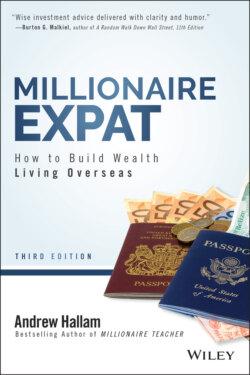Читать книгу Millionaire Expat - Andrew Hallam - Страница 20
Fast‐Growing Economies Can Produce Weak Returns
ОглавлениеAdding to the difficulty of predicting stock market growth is the fact that emerging stock markets don't seem to follow the same rules. For example, everybody knows that China's economic growth has run circles around US growth for the past 20 years. But here's a trivia question to ask a friend. Knowing what you know now, if you went back 27 years in a time machine with $10,000 to invest, would you want to spread your money among 100 randomly selected Chinese stocks or 100 randomly selected US stocks?
Most people would choose China. But they might end up feeling foolish. If $10,000 were invested in Chinese stocks in 1993, it would have been worth about $23,898 by March 31, 2021 (the time of this research). If, on the other hand, the same $10,000 were invested in US stocks, it would have grown to about $155,398.10
Such disparity between economic growth and stock market growth isn't prevalent just in China. Emerging markets (India, Thailand, Indonesia, etc.) have definitely benefited as villagers have migrated to cities, worked at better jobs, and spent higher wages. In some cases, their bathrooms were outhouses. Many of those same people now fart through silk. But shadier legal frameworks and poor corporate governance sometimes leave stains.
As Yale University finance professor David Swensen writes in his book Pioneering Portfolio Management, “A particularly prevalent problem in many Asian countries involves family‐controlled companies satisfying family desires at the expense of external minority shareholder wishes.”11 Most global expats are aware of the corruption among many emerging‐market businesses. Such palm greasing is one of the reasons strong economic growth doesn't always manifest itself in the stock market.
While emerging‐market economic growth has run circles around US growth, the developed world's stock markets haven't been left behind.
If $100,000 were invested in US stocks in 1985, it would have grown to about $5.75 million by March 31, 2021. If it were invested in developed‐world stocks (excluding the United States), it would have grown to roughly $2.36 million. If it were invested in emerging‐market stocks from January 1985 until March 31, 2021, it would have grown to about $2.47 million.12
Don't, however, commit to believing US stocks will continue to win in the years or decades ahead. They might. But often, one time period's winner is the next time period's loser. Nobody knows which stock markets are going to do well this year or over the next decade. That's why smart investors are like the young gardener I mentioned at the beginning of this chapter. They sow every type of seed. They invest in a representation of the entire world's market so they don't get caught with their pants down when a sector takes off (or when a specific stock market sector falls off a cliff).
Many people hire advisors to guess which investment sectors they think will do well. But speculating is silly, as I'll show in later chapters. Instead of rolling the dice with a soothsayer, trying to predict which market will outperform, it's better to diversify money across every sector at the lowest possible cost.
Unfortunately, many global expatriates fail to do so. They chase whatever market has performed well lately (or over the past 15 years) to the detriment of everything else. And their retirements often pay the price.
